Last Saturday, a dozen or so people rode naked through the streets of Taipei.
Well, as naked as local mores allow. “Bare as you dare” might be the slogan of the World Naked Bicycle Ride (WNBR), but “Bare as the ROC laws permit” is probably more relevant to its Taiwan iteration, the 4th annual Taipei Naked Ride (台北裸騎).
“Last year someone called the police,” says you-can-call-me Yung-luen, spokesperson for the group. Like everybody interviewed for this article, he clearly feels less exposed by not giving his real name.
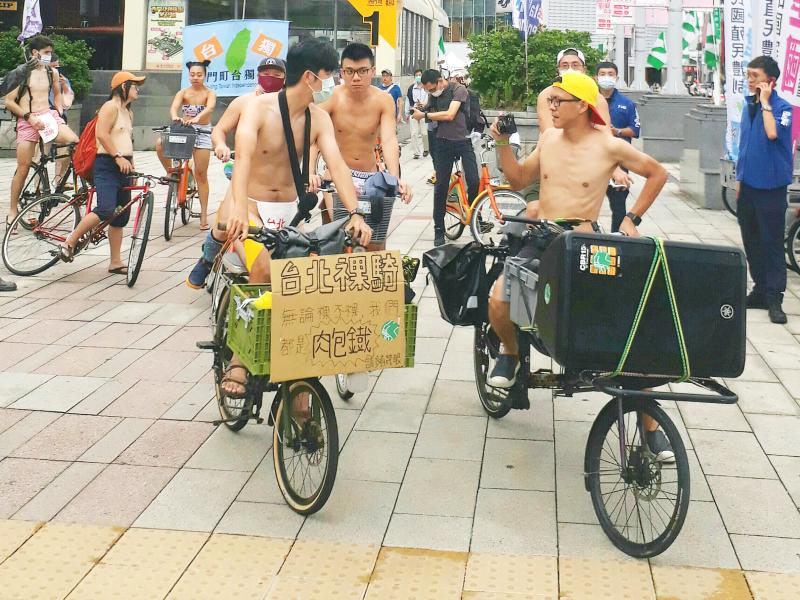
Photo: Mark Caltonhill
And, whether by stealth or coincidence — or simply because there is a police station about 50m away — the boys in blue turn up almost as soon as the group starts to assemble at Exit 1 of Ximen MRT Station for a 4pm roll out. This, despite the meeting point having been switched and only announced on social media at the eleventh hour.
“You cannot do that here,” they tell the group. Though whether their emphasis is on “do that” or “here” isn’t immediately clear. For a few minutes it appears the event might peter out before it even begins. Undaunted, Yung-luen starts to strip off, followed by the others. He is completely naked except for a loin cloth stamped with the event’s name and date. Everyone else wants one for a souvenir, even though most wear undergarments or bikinis.
HARMLESS HABIT
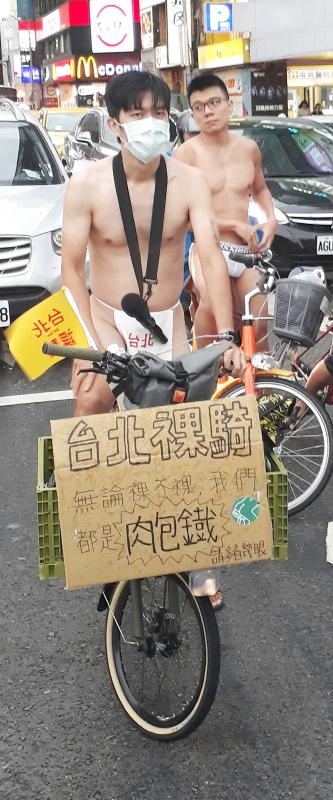
Photo: Mark Caltonhill
It will be ironic if we are stopped, he says, since riding naked doesn’t hurt anyone.
“And the police are infamous about ignoring dangerous driving behavior, like double parking.” According to Ministry of Transportation and Communication statistics, traffic accidents injure hundreds of thousands of people each year in Taiwan, and kill around 3,000, including more than 100 cyclists.
Negotiations continue between the police officers and co-organizer “Azai.” It turns out their concern is neither “that” nor “here,” but the loudspeaker system mounted on the front of his cargo bike and the microphone hanging around his neck.

Photo: Mark Caltonhill
Since the birthday-suiters haven’t applied for a permit to hold a demonstration — unlike the nearby Establish an Independent Country (獨立建國) campaign which similarly uses flag-bearing tricycles to promote their message — they won’t be allowed to make speeches, political or otherwise.
“We did try to apply for a permit a couple of years ago, but the city government got wind of it and took away our grant,” says Yung-luen.
Not that they were sponsored to ride in the nude; he’s referring to financial support for another pro-cycling activity that many of the group’s members are also involved in.
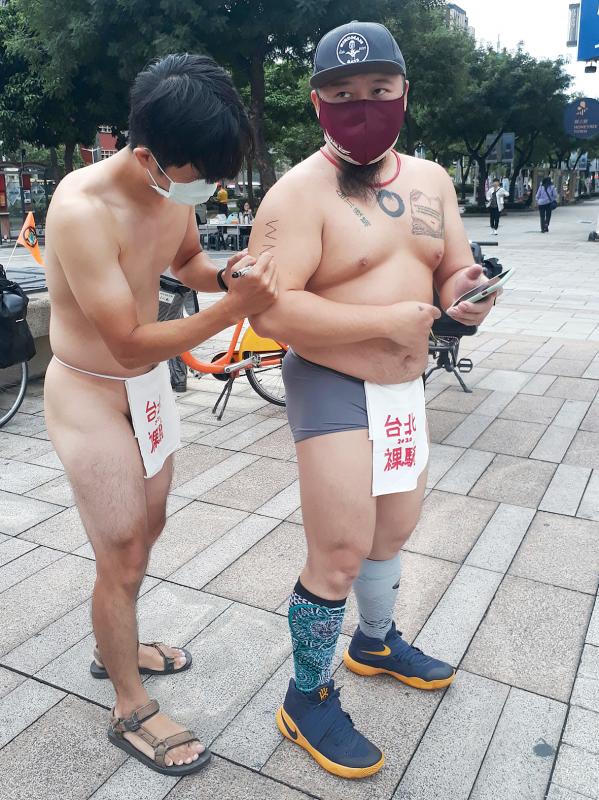
Photo: Mark Caltonhill
“I’d rather you didn’t mention what that is,” he adds, intensifying the cloak-and-dagger atmosphere.
After a few touch-ups of body paint and the application of temporary tattoos, the group heads off through the fashion and pop-culture area around Ximending, dancing in their saddles to the music blasting from Azai’s speaker system. The party atmosphere clearly gives them confidence, so one can only guess how Da-bao — who is more naked than most — feels having taken a wrong turn and spends the next hour cycling alone through the downtown streets.
Perhaps onlookers just think he is sporting the latest fashion, or that it is a publicity stunt put on by a record or cinema celebrity’s agency. This area is, after all, alive with all kinds of people in all manner of costumes, sometimes complex cosplay, sometimes pretty scanty.
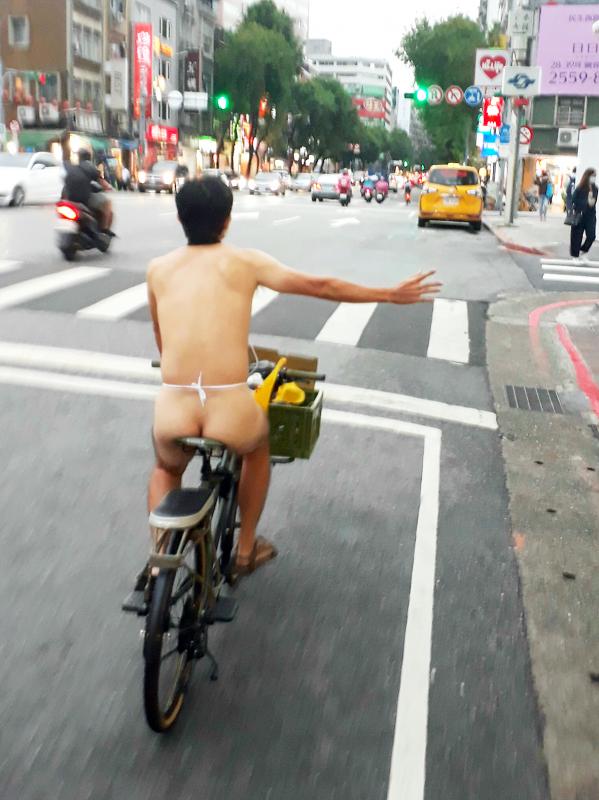
Photo: Mark Caltonhill
As the main group heads northward, people on the sidewalks look generally amused and supportive, especially young women who frequently clap, cheer or give thumbs-up, often to the disapproval of their male partners. Many take photos, several shout encouragement, but no one strips off to join in. And no one seems to ask what the point of the ride is.
REASONS TO BE NAKED
Although not directly affiliated to the WNBR, Yung-luen will later upload the Taipei group’s information and photos from today’s ride to their Wiki site.
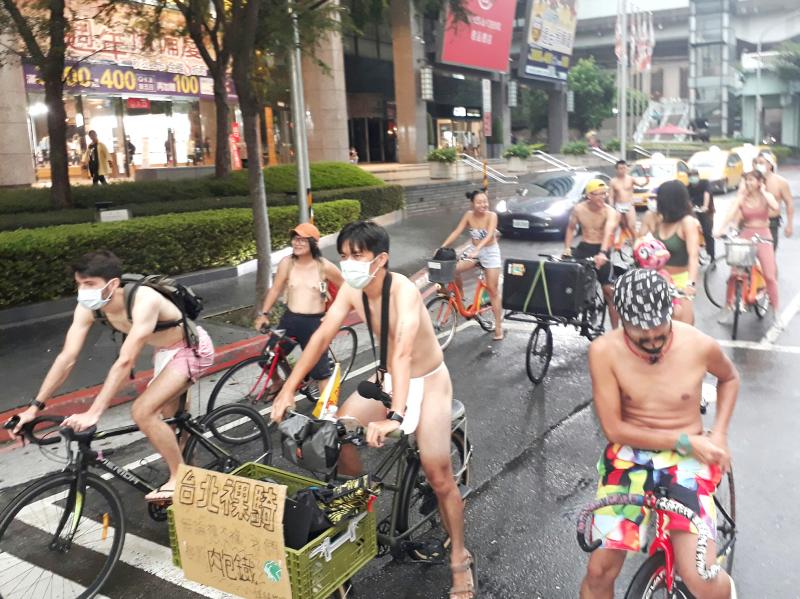
Photo: Mark Caltonhill
“We also try to accord with their guiding principles and mission statement,” he says.
According to the Web site of WNBR Vancouver, where the movement was started in 2004 by South African Conrad Schmidt, the event began as an act of simplification and human harmony. That, “for a future to exist for tomorrow’s generations, people need to stop wasting the life blood energy of the Earth, stop fighting and killing in the name of consumerist wealth accumulation and learn to love and respect all life on this planet.”
This was later simplified into a protest against society’s dependence on oil and, subsequently, into a wide-ranging pro-cycling activity with an emphasis on safety.
“For me it’s about car drivers’ lack of respect,” says “Sunny,” who has been on all three previous naked rides and is one of three women today. “No respect and no space.”
And indeed, the only negative energy today comes from car drivers who frequently hoot their horns at the riders. “Not that this is unique to Taiwan,” says “Bob,” the only foreigner participating today. “In London there’s practically a war between riders and drivers, especially taxi drivers.”
The group follows the traffic laws carefully: no one jumps a red light, and arm signals are given punctiliously when turning [PHOTO 4][PHOTO 5]. Nevertheless, this is what cyclists have to put up with every day of the year, says Yung-luen.
“If drivers normally paid this much attention to cyclists, I believe traffic casualties would go down significantly,” he says.
His banner emphasizes that cyclists are vulnerable to the whims of car drivers. Twisting the advertising slogan of car manufacturers that drivers and passengers are “flesh ensconced in steel” (鐵包肉), it proclaims: “Whether naked or not, we are all ‘steel wrapped with flesh,’” the “steel horse” bit slang for a bicycle.
By now, the group has moved north of Taipei Main Station, and a number of tourists shopping for traditional snacks and souvenirs in Dihua Street and taking selfies in front of the City God Temple (城隍廟) seem to think it is just part of the regular entertainment they could witness any weekend of the year.
And who knows, maybe it will catch on.

That US assistance was a model for Taiwan’s spectacular development success was early recognized by policymakers and analysts. In a report to the US Congress for the fiscal year 1962, former President John F. Kennedy noted Taiwan’s “rapid economic growth,” was “producing a substantial net gain in living.” Kennedy had a stake in Taiwan’s achievements and the US’ official development assistance (ODA) in general: In September 1961, his entreaty to make the 1960s a “decade of development,” and an accompanying proposal for dedicated legislation to this end, had been formalized by congressional passage of the Foreign Assistance Act. Two

Despite the intense sunshine, we were hardly breaking a sweat as we cruised along the flat, dedicated bike lane, well protected from the heat by a canopy of trees. The electric assist on the bikes likely made a difference, too. Far removed from the bustle and noise of the Taichung traffic, we admired the serene rural scenery, making our way over rivers, alongside rice paddies and through pear orchards. Our route for the day covered two bike paths that connect in Fengyuan District (豐原) and are best done together. The Hou-Feng Bike Path (后豐鐵馬道) runs southward from Houli District (后里) while the

March 31 to April 6 On May 13, 1950, National Taiwan University Hospital otolaryngologist Su You-peng (蘇友鵬) was summoned to the director’s office. He thought someone had complained about him practicing the violin at night, but when he entered the room, he knew something was terribly wrong. He saw several burly men who appeared to be government secret agents, and three other resident doctors: internist Hsu Chiang (許強), dermatologist Hu Pao-chen (胡寶珍) and ophthalmologist Hu Hsin-lin (胡鑫麟). They were handcuffed, herded onto two jeeps and taken to the Secrecy Bureau (保密局) for questioning. Su was still in his doctor’s robes at

Mirror mirror on the wall, what’s the fairest Disney live-action remake of them all? Wait, mirror. Hold on a second. Maybe choosing from the likes of Alice in Wonderland (2010), Mulan (2020) and The Lion King (2019) isn’t such a good idea. Mirror, on second thought, what’s on Netflix? Even the most devoted fans would have to acknowledge that these have not been the most illustrious illustrations of Disney magic. At their best (Pete’s Dragon? Cinderella?) they breathe life into old classics that could use a little updating. At their worst, well, blue Will Smith. Given the rapacious rate of remakes in modern